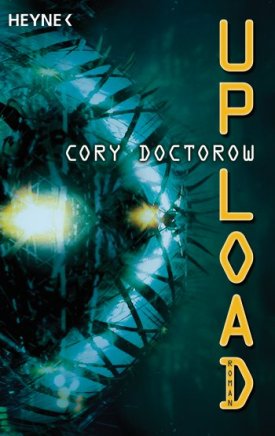News

My second novel Eastern Standard Tribe has been published in German by Heyne, under the title Upload. As with the German edition of Down and Out in the Magic Kingdom (published as Download), they’ve released the German text under a Creative Commons Attribution-NonCommercial-ShareAlike. Given that Heyne’s a division of the mega-publisher Bertelsmann, this is pretty cool news — especially considering that the CC release was their idea!
I did a recent interview about CC licensing and science fiction with the German net-show WatchBerlin, too.
Link to free text of Upload/Eastern Standard Tribe, Link to WatchBerlin episode
Update: There’s also an interview with me from the German netcase NetzPolitik: Link
My latest InfoWeek column, “In Defense Of Complaining,” went online while I was on break earlier this month — it’s a rebuttal to people who say that people who are upset about bad products should just buy something else, rather than complaining:
I’m always astounded by this reaction. Companies aren’t charities. They’re businesses. It doesn’t matter why they’re offering an unacceptable product — all that matters is that the product is unacceptable. Companies aren’t five-year-olds bringing their fingerpaintings home from kindergarten. We don’t have to put on a brave smile and tell them, “that’s just lovely dear,” and display their wares proudly on the fridge. I don’t care if Apple adds DRM because Lars from Metallica has incriminating photos of Steve Jobs, I don’t care if Sony BMG put a rootkit on its CDs because they were duped into it by a trickster spirit that appeared to their technologists in a dream. I care whether their product is worth my money. It’s the market — there’s no A for Effort.
Even weirder is the idea that companies shouldn’t be criticized because in a market, you should just take your business elsewhere. Free markets thrive on good information. For a market to function, customers need to have good information about which goods are worth buying and which ones should be avoided — that’s why we complain in public, to help companies make better decisions.
Link
Knowledge isn’t property: Guardian column
My latest Guardian column, “‘Intellectual property’ is a silly euphemism” is online — in it, I argue that although knowledge is important and valuable, it’s not property, and when we treat it as such, it makes us do dumb things. Hervé Le Crosnier liked it and translated it into French and put it online under a CC license.
It’s this disconnect that makes the “property” in intellectual property so troublesome. If everyone who came over to my flat physically took a piece of it away with them, it’d drive me bonkers. I’d spend all my time worrying about who crossed the threshold, I’d make them sign all kinds of invasive agreements before they got to use the loo, and so on. And as anyone who has bought a DVD and been forced to sit through an insulting, cack-handed “You wouldn’t steal a car” short film knows, this is exactly the kind of behaviour that property talk inspires when it comes to knowledge.
But there’s plenty of stuff out there that’s valuable even though it’s not property. For example, my daughter was born on February 3, 2008. She’s not my property. But she’s worth quite a lot to me. If you took her from me, the crime wouldn’t be “theft”. If you injured her, it wouldn’t be “trespass to chattels”. We have an entire vocabulary and set of legal concepts to deal with the value that a human life embodies.
What’s more, even though she’s not my property, I still have a legally recognised interest in my daughter. She’s “mine” in some meaningful sense, but she also falls under the purview of many other entities - the governments of the UK and Canada, the NHS, child protection services, even her extended family - they can all lay a claim to some interest in the disposition, treatment and future of my daughter.
Link,
Link to French version

Metropolis, a German/French documentary series from Arte.tv, shot a short documentary with me about online freedom and surveillance, and science fiction. They’ve put the episode online as a free, remixable, Creative Commons licensed download.
Link
Posted to Boing Boing yesterday — but in the hustle and bustle, forgot to put i t here!

I am ecstatic to announce a new Happy Mutant on the scene:
Poesy
Emmeline
Fibonacci
Nautilus
Taylor
Doctorow. Hatched at home, in a pool, this morning, in London, weighing 9 lbs and 6 oz. All bits correct and accounted for. Already stolen the hearts of all who see her.
Consider me on paternity leave until further notice.
Link
Forbes magazine just published my latest article for them, a piece for a special on global pop culture about the “otaci” — Romanian manga enthusiasts who remix French, Japanese and American comic styles, language and stories:

The artwork in the individual panels veered from traditional Japanese manga to surreal, “adult” images seemingly lifted from the French classic magazine Métal Hurlant to stuff that could have come from the pages of the latest Marvel comic. The text, too, was a glorious linguistic salmagundi, mostly Romanian, but with English, French and Japanese phrases sprinkled liberally throughout.
“What the hell is this thing?” I shouted at Stefan, over the din of the monstrous, grinding automated mojito machine that was attempting to crush lemons beside us.
“They choose different languages and styles based on the kind of stories they want to tell,” he said.
Link
In my new Guardian column, “Copyright law should distinguish between commercial and cultural uses,” I argue for a new kind of copyright law, one that mirrors the “folk copyright” that individuals have lived by for decades — the alternative is to try to get kids and fans to participate in the “real” copyright, a system of industrial regulation so complex that it can barely be understood by full-time copyright attorneys.
This is a genuinely radical idea: individuals should hire lawyers to negotiate their personal use of cultural material, or at least refrain from sharing their cultural activities with others (except it’s not’s really culture if you’re not sharing it, is it?).
It’s also a dumb idea. People aren’t going to hire lawyers to bless the singalong or Timmy’s comic book. They’re also not going to stop doing culture.
We need to stop shoe-horning cultural use into the little carve-outs in copyright, such as fair dealing and fair use. Instead we need to establish a new copyright regime that reflects the age-old normative consensus about what’s fair and what isn’t at the small-scale, hand-to-hand end of copying, display, performance and adaptation.
Link
Publishers Weekly has published an amazing feature on my forthcoming novel Little Brother, and all the buzz it’s gotten so far:

Little Brother offers more in the way of circuit boards than gears, and could almost be read with a laptop in hand. Marcus frequently makes reference to hacks (ways to reprogram computers and other devices to suit one’s needs), Internet history (such as the protocols that make email work) and privacy-protection programs (like The Onion Router, which allows users to access Web sites that might otherwise be blocked by censorware), all of which beg to be looked up on Google or Wikipedia. In addition, Doctorow makes use of Internet slang known as “leetspeak” (Marcus describes a female friend as “totally h4wt,” and notes that some of his attempts to interfere with the DHS surveillance might be considered “a little aggro,”as well as acronyms for activities that range from “ARGing” to “LARPing” (participating in Alternate Reality Games or Live Action Role Play).
“One thing I admire is that everything he talked about in the book, he explained—at least to the extent you could get an idea of it,” says Jordan Gower, a bookseller at Harry W. Schwartz Bookshops in Milwaukee, Wis. “But he didn’t do it in a way like he’s trying to teach a child. It was more like he was just spreading his information.” Nielsen Hayden believes that Doctorow “nailed” the book’s language (at least according to his nephews, he jokes), though he also admits that there’s always a danger of slang becoming outmoded. “The Internet speeds up the process by which kid language and slang evolve and change,” he says.
Link
Here’s my latest column for CBC’s Search Engine — my Facebook Faceplant editorial.
Link

Matt sez, “The science fiction and software event Penguicon is converting its volunteer rewards system into Whuffie, the reputation economy from Cory Doctorow’s science fiction novel Down and Out in the Magic Kingdom. The attendance badges and currency will use a barcode system to track individual work throughout multiple years. It is described in this post to the Penguicon blog.”
Stupendous! I had a completely rockin’ time a Penguicon a couple years back — it’s the perfect mix of geek passions. Plus, Whuffie’s about as stable a currency as you’re likely to find these days as half a petabuck of toxic debt gets de-leveraged.
Link
(Thanks, Matt!)

|












